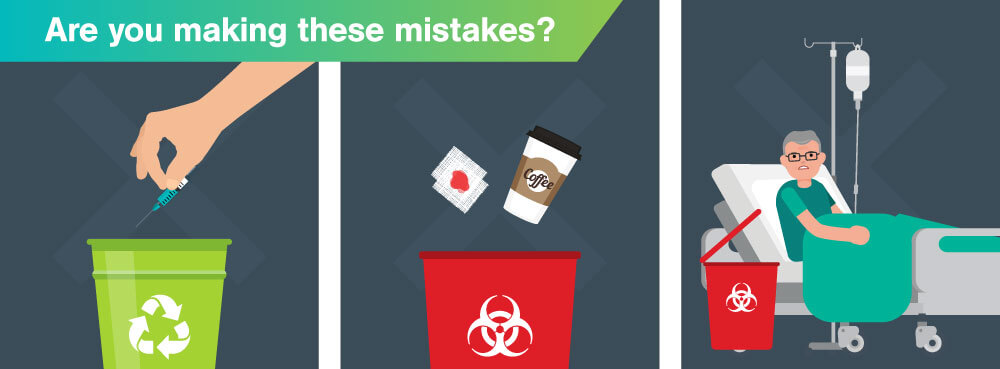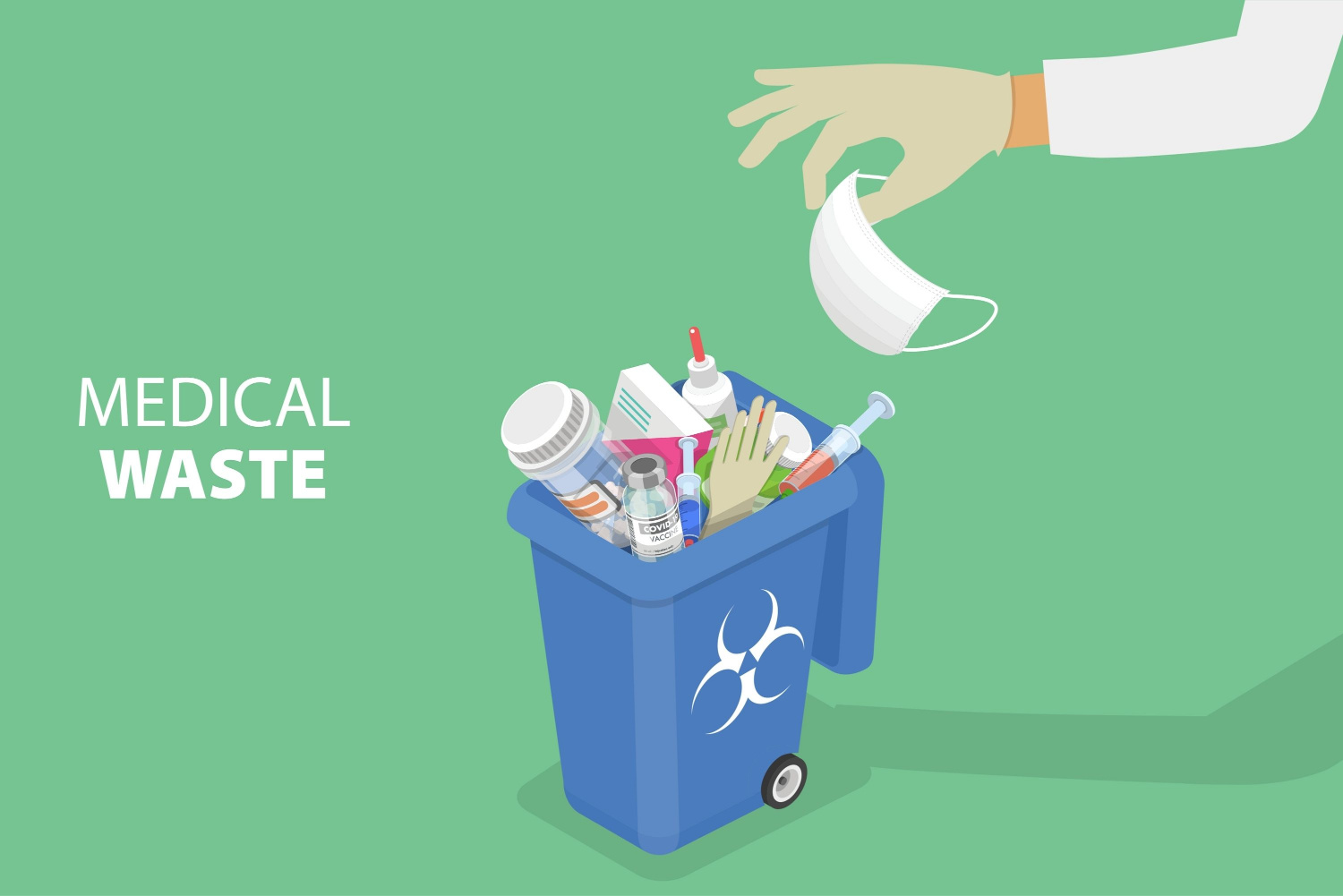Safe and Efficient Medical Waste Removal: Your Trusted Environmental Companion
Wiki Article
Guaranteeing Safe Handling and Disposal of Medical Waste
Guaranteeing secure handling and disposal of clinical waste is of paramount significance in health care setups. Improper management of clinical waste can pose considerable threats to the setting, public health, and healthcare employees. In this introduction, we will certainly check out the relevance of appropriate medical waste administration, the risks linked with inappropriate handling and disposal, as well as the standards and techniques that can be executed to ensure its safe disposal.Significance of Appropriate Clinical Waste Administration
Correct medical waste administration is of utmost significance in making certain the safety and security and wellness of medical care experts, patients, and the basic public. Medical waste describes any waste produced by healthcare facilities throughout the diagnosis, therapy, or immunization of pets or humans. This waste can posture severe health dangers if not taken care of and thrown away correctly.
One of the primary reasons correct clinical waste monitoring is vital is to stop the spread of transmittable conditions. Medical waste, such as utilized needles, infected dressings, and biological products, can lug dangerous microorganisms. Otherwise dealt with and disposed of properly, these virus can be transmitted to health care employees, patients, waste handlers, and even the basic public, bring about the prospective outbreak of conditions.
Furthermore, appropriate medical waste administration aids safeguard the setting - medical waste disposal service. Clinical waste has hazardous products, consisting of chemicals, drugs, and contaminated substances. When not managed appropriately, these substances can infect dirt, water bodies, and the air, posing a considerable danger to ecological communities and public wellness
Furthermore, reliable clinical waste monitoring makes certain conformity with neighborhood laws and international standards. Federal governments and regulative bodies have actually developed guidelines and protocols to guarantee the safe handling, storage space, transportation, and disposal of medical waste. Adhering to these laws is important to stay clear of legal effects and maintain the online reputation and reliability of medical care facilities.
Threats of Improper Handling and Disposal
If clinical waste is not effectively disposed of,Patients can also be subjected to these transmittable diseases. For circumstances, if infected needles or other sharps are not disposed of in assigned puncture-proof containers, they may unintentionally prick people, bring about possible infections. Moreover, if clinical waste is not set apart appropriately, there is a danger of cross-contamination between different sorts of waste, further increasing the chances of disease transmission.
Incorrect disposal of medical waste can additionally have harmful effects on the atmosphere and the general public. If clinical waste is not dealt with and dealt with appropriately, it can infect water sources, soil, and air, leading to the spread of conditions and contaminants. This can have long-lasting consequences on ecosystems and public wellness.
Standards for Safe Handling of Medical Waste
Applying reliable methods for the secure handling of clinical waste is important in making certain the defense of health care experts, individuals, and the public. These guidelines are critical in lessening the risks linked with the handling and disposal of medical waste, such as infections, injuries, and ecological pollution.First and leading, healthcare centers must develop a thorough waste monitoring strategy that abides by local, national, and worldwide laws. This strategy should include clear guidelines on waste partition, packaging, transport, labeling, and storage. It is essential to divide various sorts of waste, such as sharps, infectious materials, pharmaceuticals, and non-hazardous waste, to stop cross-contamination and advertise risk-free disposal.
In addition, medical care personnel must receive detailed training on appropriate waste handling methods. They ought to be informed on the prospective hazards of medical waste, the appropriate use individual safety tools (PPE), and the correct procedures for managing, transporting, and taking care of different sorts of waste.
Additionally, health care centers need to routinely keep track of and investigate their waste monitoring techniques to guarantee conformity with guidelines. This consists of performing normal assessments, assessing waste handling procedures, and offering responses and training to team members.
Efficient Techniques for Garbage Disposal
To ensure the risk-free handling and disposal of clinical waste, it is vital to utilize reliable strategies for waste disposal. Clinical waste can pose substantial risks to public health and wellness and the environment otherwise handled and taken care of appropriately. Health care centers and waste monitoring organizations have to execute proper strategies to minimize these threats.One reliable method for waste disposal is segregation. It includes dividing different kinds of clinical waste based on their features. Segregation enables the correct therapy and disposal of each waste category, lowering the possibility for contamination or harm. Healthcare facilities should give clear guidelines and training to team member on just how to set apart waste correctly.

In addition, healthcare facilities ought to collaborate with licensed waste management business to make certain correct disposal of medical waste. These companies have the experience and equipment required to safely deal with and dispose of clinical waste in conformity with laws and best practices.
Training and Education for Medical Care Professionals
Healthcare experts play a crucial duty in making sure the risk-free handling and disposal of medical waste via detailed training and education and learning. It is necessary for doctor to have a deep understanding of the prospective dangers associated with clinical waste and the proper procedures for its administration. By getting correct training, medical care experts can lessen the prospective transmission of infectious diseases, prevent ecological contamination, and secure both themselves and the public.
Moreover, training programs need to highlight making use of individual protective devices (PPE) and proper hand health practices when taking care of medical waste. medical waste removal. Healthcare professionals should understand how to appropriately use and get rid of of PPE to protect themselves from prospective direct exposure to harmful products. They ought to also be enlightened on the importance of normal handwashing and the proper usage of hand sanitizers to lessen the spread of contagious conditions
Continuing education and learning and routine updates on medical waste management techniques are critical for health care experts. As policies and guidelines progress, it is vital to keep doctor informed regarding any adjustments in protocols and finest techniques. This will certainly ensure that they stay updated and keep a high criterion of safety in managing and getting rid of of clinical waste.
Verdict
Finally, correct handling and disposal of medical waste is crucial to make sure the safety of medical care experts, people, and the setting. Overlooking to follow standards and guidelines can lead to different dangers and dangers. Applying reliable approaches for garbage disposal and giving appropriate training and education for health care professionals are crucial in maintaining a risk-free healthcare atmosphere. By adhering to these methods, we can minimize the possible dangers connected with medical waste.Clinical waste refers to any type of waste created by health care centers during the diagnosis, treatment, or immunization of humans or pets. If medical waste is not set apart appropriately, there is a threat of cross-contamination between various kinds of waste, further raising the possibilities of disease transmission.
It is essential to divide different kinds of waste, such as sharps, transmittable products, drugs, and non-hazardous waste, to stop cross-contamination and promote secure disposal. WasteX Medical Waste Disposal.
To make certain the risk-free handling and disposal of medical waste, it is important to utilize effective methods for waste disposal. click site Additionally, health care centers should develop a normal waste collection and transportation routine to protect against waste buildup and lessen the threat of accidents or contamination.
Report this wiki page